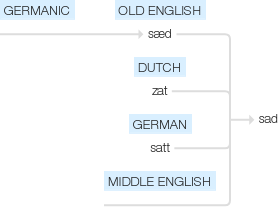Sad
Old English sæd ‘sated, weary’, also ‘weighty, dense’, of Germanic origin; related to Dutch zat and German satt, from an Indo-European root shared by Latin satis ‘enough’. The original meaning was replaced in Middle English by the senses ‘steadfast, firm’ and ‘serious, sober’, and later ‘sorrowful’.
wiktionary
From Middle English sad, from Old English sæd(“sated, full”), from Proto-Germanic *sadaz(“sated, satisfied”), from Proto-Indo-European *seh₂-(“to satiate, satisfy”).
sad (plural sads)
etymonline
sad (adj.)
Old English sæd "sated, full, having had one's fill (of food, drink, fighting, etc.), weary of," from Proto-Germanic *sathaz (source also of Old Norse saðr, Middle Dutch sat, Dutch zad, Old High German sat, German satt, Gothic saþs "satiated, sated, full"), from PIE *seto-, from root *sa- "to satisfy." Related: Sadder; saddest.
Sense development passed through the meaning "heavy, ponderous" (i.e. "full" mentally or physically), and "weary, tired of" before emerging c. 1300 as "unhappy." An alternative course would be through the common Middle English sense of "steadfast, firmly established, fixed" (as in sad-ware "tough pewter vessels") and "serious" to "grave." In the main modern sense, it replaced Old English unrot, negative of rot "cheerful, glad."
Meaning "very bad" is from 1690s. Slang sense of "inferior, pathetic" is from 1899; sad sack is 1920s, popularized by World War II armed forces (specifically by cartoon character invented by Sgt. George Baker, 1942, and published in U.S. Armed Forces magazine "Yank"), probably a euphemistic shortening of common military slang phrase sad sack of shit.
